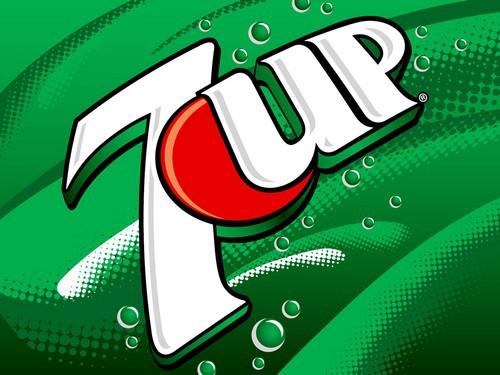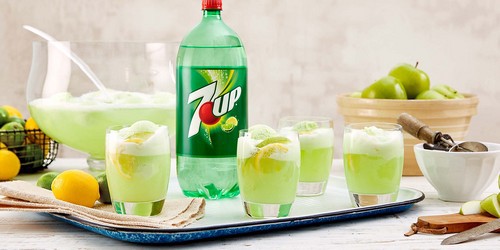The Marketing mix of 7Up analyses the 4Ps of 7Up, which includes the Product, Price, Place, and Promotion of 7Up. 7Up is a popular soft drink associated with urban and rural markets’ food and beverage industry. It is a subsidiary brand, and the rights to this brand are held in the United States by Dr. Pepper Snapple and in the rest of the world market by PepsiCo.
The drink was originally from the United States and was introduced in the consumer market in th29 as Bib-Label Lithiated Lemon-Lime Soda and again in th36 as 7Up. Charles Leiper Grigg created it, one of the most popular drinks in the consumer market. 7Up faces tough competition from the following
- Limca
- Sprite
About 7Up
- Type: Soft drink
- Industry: Beverages
- Founded: 1929
- Founder: Charles Leiper Grigg
- Headquarters: Plano, Texas, USA
- Area served: Worldwide
- Current CEO: Laxman Narasimhan
- Number of employees: 17,000
- Major products: 7Up, Diet 7Up, 7Up Free, 7Up Cherry, 7Up Retro
Table of Contents
7Up Product Strategy
7Up is a soft drink with no caffeine content. This aerated drink is flavored with lemon and lime and is popular because of its refreshing quality and great taste. It is available in several sizes of cans, glass bottles, and pet bottles. 7Up has several variants to its name, and some of them are as follows-
- Tropical 7 Up – This variant of 7Up has the distinctive flavor of mango/pineapple. It was launched in the consumer market as a time-limited product in 2014. Its success forced the company to re-launch with a new branding in 2015.
- Diet 7 Up – This diet soda version was introduced as Like for the first time in 1963 and was later discontinued. In the year 1970, a new formulation was introduced.
- 7 Up Retro – This variation was introduced during the season finale of The Apprentice in 2011. Its formulation includes sugar instead of HFCS for its sweetener. It is available in 12-oz cans and glass bottles.
- 7 Up Ten – This blend was launched in 2013 and contains ten calories. Ten variations of this drink were introduced side by side. The blend was created using fructose corn syrup, acesulfame potassium, and aspartame, which was added to sweeten it.
- Cherry 7 Up – It was introduced in the year 1987 and has a cherry flavor
- Raspberry 7 Up- It has the flavor of lemon-lime-raspberry.
- Orange 7 Up is a clear-colored soft drink with a lemon-lime-orange flavor.
- Diet Cherry 7 Up – This version has been re-introduced because of popular demand.
- 7 Up Free – It has no sugar colorings, caffeine content, or preservatives.
- 7 Up Cherry – Minor adjustments have been made to the recipe to create a popular flavor.
- 7 Up Light – It is one of the diet variants of 7Up.
- 7 Up Lime – It has less carbon content with 5% lime juice
- 7 Up Mojito Flavour -it was launched in the year 2014 and does not include caffeine, color, and
- Salted Lemon 7 Up – It is a common drink and is made of 7Up and Salted Lemon
- 7 Up Revive – It was launched in 2015.
7Up, a famous soft drink brand, offers a variety of products in its mix.
The product mix of 7Up in 2023 is as follows (Source)
- Original 7Up: The classic, lemon-lime flavored carbonated soft drink known for its crisp, clean taste without caffeine.
- Diet 7Up: A low-calorie version of the original 7Up, using artificial sweeteners instead of sugar to cater to health-conscious consumers and those monitoring their sugar intake.
- 7Up Cherry: This variant adds a cherry flavor to the traditional 7Up formula, offering a unique twist on the classic taste.
- 7Up Ten: Introduced as part of a line of sodas with only ten calories per serving, 7Up Ten maintains a taste similar to the original with fewer calories.
- 7Up Free: Available in some markets, this is a sugar-free version of 7Up, often sweetened with artificial sweeteners like aspartame and acesulfame potassium.
- 7Up Lemon Lemon: A line of sparkling lemonade, blending 7Up with lemon juice, available in several flavors such as traditional, blackberry, and peach.
- 7Up Revive: A hydrotonic drink available in some markets, formulated with vitamins and electrolytes, marketed as a hydration and recovery beverage.
The availability of these products may vary by region, and the brand occasionally introduces limited-edition flavors or special formulations. Additionally, the brand is known for frequent marketing and packaging updates to appeal to different consumer segments and occasions.
7Up Place Strategy
7Up started its journey from America and, with time, spread its product presence in several countries of the world, including the United Kingdom, Austria, Netherlands, Denmark, Hong Kong, Norway, Singapore, Pakistan, Uruguay, UAE, Philippines, Colombia, Finland, Argentina, Spain, Ireland, France, Canada, and Iceland. It was launched in the Indian market in 1990.
7Up brand has taken the help of its owner companies in the United States and the rest of the world to create a powerful brand and a powerful and widespread distribution channel that includes supply chain management services, retailers, and suppliers.
Its variants are now easily available in every nook and corner of a place via fast-food joints, restaurants, hotels, highways, petrol pumps, supermarkets, cafes, discos, hypermarkets, grocery stores, corner shops, and convenience stores.
7Up’s place strategy is as follows:
- Global Distribution: 7Up products are distributed globally and are available in numerous countries worldwide, ensuring a wide-reaching presence in both developed and emerging markets.
- Retail Outlets and Supermarkets: The brand ensures prominent placement in retail outlets and supermarkets, making it easily accessible to the everyday consumer and rural market.
- Vending Machines and Convenience Stores: 7Up is also widely available in vending machines and convenience stores, catering to on-the-go consumers seeking quick refreshments.
- Online Sales Channels: Embracing digital trends, 7Up is available through online grocery platforms and e-commerce sites, allowing for easy purchasing and home delivery.
- Partnerships with Food and Beverage Outlets: The brand has established partnerships with various restaurants, fast-food chains, and cinemas, ensuring visibility and availability in dining and entertainment venues.
7Up Pricing Strategy
7Up has targeted people from all age groups and all classes like upper, middle, and lower, and male, female, or kids as its target customers. It looks at people seeking an aerated drink for parties, occasions, and regular usage. The brand has positioned itself as a refreshing drink that has the power to blow away your thirst and tiredness.
The soft drink market is very competitive, and 7Up is directly facing competition from several set brands in the diet market. The company has adopted a competitive pricing policy and has kept its product prices at a marginal level and at par with the prices set by rival brands. The prices are reasonable and affordable, so the brand has maintained higher volumes and more significant revenues.
The pricing strategy of 7Up, a brand known for its innovative and consumer-focused approach, is as follows:
- Competitive Pricing: 7Up often employs competitive pricing, positioning its products at a price point that is comparable to other beverages in the soft drink market. This same price strategy helps to maintain its market share in a highly competitive industry.
- Psychological Pricing: The brand sometimes uses psychological pricing tactics, like pricing products at $0.99 instead of $1.00, to make the price appear significantly lower, thereby attracting cost-conscious consumers.
- Promotional Pricing: 7Up frequently uses promotional pricing strategies, offering temporary price reductions, value packs, or bundle deals. This approach is particularly effective in driving sales volume and attracting new customers.
- Segmented Pricing: Understanding the diverse market segments, 7Up employs segmented pricing. This means the product may be priced differently based on the region, distribution channel, or packaging size to cater to the varying willingness to pay across different consumer groups.
- Dynamic Pricing: With the rise of digital sales channels, 7Up has the flexibility to move customer services and employ dynamic pricing strategies, where prices can be adjusted in response to market demand, competition, and other external factors. This approach ensures maximized profits and market adaptability.
By balancing these various pricing strategies, 7Up effectively addresses the needs and expectations of its broad consumer base while remaining competitive and profitable in the dynamic beverage industry.
7Up Promotion Strategy
7Up has adopted an aggressive marketing strategy to increase its brand value and consumer market visibility. It has created some fantastic ad campaigns that are shown via television channels, radio, newspapers, magazines, billboards, hoardings, at events that are part of its promotional gimmick, and at the sides of vehicles.
The brand is aware of social and other print media channels’ coverage and has started campaigning via its Facebook page, Twitter account, YouTube, and official website.
In 1967, a campaign called UNCOLA was launched, resulting in booming sales. Since then, the tag has become synonymous with 7UP. In 1982, another ad campaign with the tagline No Caffeine was launched, and the brand again saw unprecedented sales volume. Geoffrey Holder was roped in as part of 7Up’s ad campaigns in the 70s and 80s.
The cartoon character from television Fido Dido was its mascot from the late 1980s to the beginning of the 1990s. He was introduced in early 2000 to the international market. In the 1950s, Fresh-Up Freddie was the brand’s rooster mascot, who gave lessons via ads on giving parties by including 7Up in its menu.
The company has marketed it as a healthy and cheap alternative to the other soft drinks in the consumer market. Orlando Jones was roped in for an ad campaign in 1999 with the tagline, Make 7Up Yours. The company has been quite successful with the ad campaigns that have helped it reach new heights and better brand visibility. The brand has been associated with celebrities like Sharman Joshi, Anushka Sharma, Dhanush, and Yana Gupta in India.
7Up’s promotion strategy is as follows:
- Engaging Advertising Campaigns: 7Up leverages creative and memorable advertising campaigns across print media channels, often featuring catchy slogans and appealing visuals, to enhance brand recognition and appeal to a broad audience.
- Social Media and Digital Marketing: The brand actively has a high digital marketing footprint and uses social media platforms and digital marketing techniques to engage with younger audiences and create interactive and shareable content.
- Partnerships and Sponsorships: 7Up strategically partners with events, celebrities, and other brands, utilizing sponsorships to increase visibility and associate the brand with popular culture and lifestyle.
Some Recent Video ads and Print ads of 7Up are:
Liked this post? Check out the complete series on Marketing Mix

